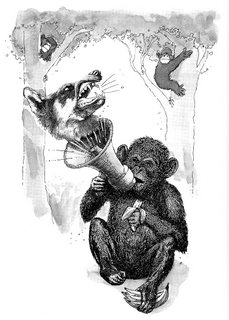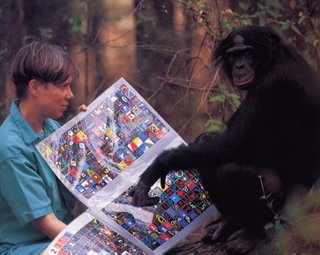
Does any other animal have a theory of mind (ToM)?
That is, can they understand that what another individual knows is different from what they themselves know? That's the question some primatologists have been attempting to answer. Like many questions of the animal mind, this one happens to be tricky to answer definitively.
Psychologists test the age at which children develop a theory of mind by using a fairly simple test. It goes something like this:
Show Sally a box of Band-Aids. Open it up and let her see the bandages inside. Then while she's watching, replace the bandages with crayons. Ask Anne to come into the room. Ask Sally what she think Anne will say is inside the box.
Children without a theory of mind think egocentrically. They believe that what they know everyone else knows too. But when they have ToM, the child is able to understand that Anne will think there are Band-Aids inside the box. There are other variants on this same basic premise.
The trick is to figure out a test that does not require language to "pass."
To figure out what non-linguistically inclined babies know, developmental psychologists rely on looking times. Babies look longer at unexpected events, such as a rolling ball that fails to reappear after it passes behind a screen.
Developmental cognitive psychologists have established empirical methods to investigate children's understanding of mentality, and, those working with primates have adapted these tests to answer a basic question of whether any primate has any capacity to conceive of mental states.
Primatologists and other investigators of animal behavior use a variety of substitutes for the term "theory of mind," asking whether animals are capable of, for example:
"Machiavellian intelligence" (Whiten & Byrne 1988)
"metacognition” (Povinelli 1993)
"mind reading" (Krebs & Dawkins 1984)
"mental state attribution” (Cheney & Seyfarth)
What underlies all is this knowledge:
Your mind is different from my mind.
What you know is different from what I know.
But why does theory of mind matter in the first place? What good does it do? And why are we interested in whether other beings have it?
I think it makes it possible for us to lie to each other, a skill that probably came in very handy in our evolutionary past. It's one of the things that makes us human. It shows we can think. Interestingly, those with autism don't seem to have a theory of mind. Understanding which animals have ToM can help us know more about our development as a species, and it might provide some insights into how autistic brains work. Eventually, we might know which circuitry got funky wiring and possibly which genes are involved. Afterall, we already know that a segment of DNA labeled foxp2 helps humans utter syntactically correct sentences and may even enable birds to learn different song dialects.
Recently NPR interviewed Sue Savage-Rumbaugh about her work with Kanzi, a bonobo who communicates with humans and bonobos alike using lexigrams, a symbolic language akin to Japanese kanji. He's been doing this virtually from birth without formal instruction like so many other apes who have been taught sign language.
 Rather than using Skinnerian conditioning, Kanzi learned that individual lexigrams had meaning and could be combined to form sentences simply by watching his mother being trained to use them. She never caught on; she started learning too late, past the critical stage for language acquisition. Later Kanzi learned like human children learn language, by being immersed in human linguistic culture. This may be the key to his success, and lest you think there is something amazingly unique about Kanzi (he could be some sort of mutant, the first of his kind to "evolve" language) you should know that he's not the only bonobo who can "talk." Savage-Rumbaugh is an outspoken proponent, one of the last ones left, of the idea that apes, at least bonobos comprehend and can produce language. Lately, she's been championing the idea that they also have a theory of mind.
Rather than using Skinnerian conditioning, Kanzi learned that individual lexigrams had meaning and could be combined to form sentences simply by watching his mother being trained to use them. She never caught on; she started learning too late, past the critical stage for language acquisition. Later Kanzi learned like human children learn language, by being immersed in human linguistic culture. This may be the key to his success, and lest you think there is something amazingly unique about Kanzi (he could be some sort of mutant, the first of his kind to "evolve" language) you should know that he's not the only bonobo who can "talk." Savage-Rumbaugh is an outspoken proponent, one of the last ones left, of the idea that apes, at least bonobos comprehend and can produce language. Lately, she's been championing the idea that they also have a theory of mind.Like all intriguing work with primates, the evidence is serendipitous and anecdotal. See below: (Fields is a colleague of S-R)
"Scientists disagree about whether apes have this ability. But Fields has no doubt. "I'm missing this finger," Fields says, holding up one of his hands. "One time when Kanzi was grooming my hand, when he got to where the missing finger is, he pretended like it was there. And then he used the keyboard, he uttered, 'Hurt?,' as though to say, 'Does it still hurt?' "
If you ask me, he could just be identifying that the hand has been hurt, not that he knows the person is in pain.
The full article can be accessed here. For dog lovers, there's also a nice piece on how much dogs understand humans. They ought to. They've been co-evolving with us for at least 100,000 years!


1 comment:
Hmmm. I think Mix-Max is really up a creek as far as having a theory of mind goes, especially if MBS is right that he is autistic...
Poor little piggy. But at least he's happy!
Post a Comment